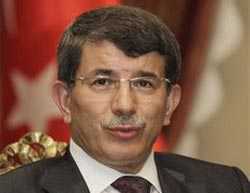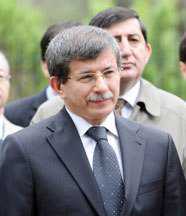 By SONER CAGAPTAY
By SONER CAGAPTAY
The AKP is setting the stage for a total recalibration of Turkey’s global compass.
Turkey is not thought of as the Muslim country par excellence, but it is perhaps the most Muslim nation in the world. Due to its unique birth during the collapse of the Ottoman Empire, as a state forged exclusively by and for Muslims through blood and war, Turkey is a Muslim nation by origin – a feature shared perhaps only with partitioncreated Pakistan.
Mustafa Kemal Ataturk’s secularization in the 1920s veneered the country’s core identity with a Kemalist, nationalistic overlay. However, a recent perfect storm has undone Ataturk’s legacy: Whereas the events of September 11 have, unfortunately, oriented Muslim-Western relations toward perpetual conflict, the Islamist-rooted Justice and Development Party (AKP) in Ankara has helped reexpose the country’s core identity. When the AKP came to power in 2002, many expected that the party’s promise to de-Kemalize Turkey by blending Islam and politics would not only create a stronger Turkey, but would prove Islam’s compatibility with the West. The result, however, has been the reverse.
The AKP has eschewed Ataturk’s vision of Turkey as part of the West, preferring a Manichean “us [Muslims] vs them” worldview. Hence, in the post- September 11 world, stripped of its Kemalist identity, Turkey’s self-appointed role is that of “leader of the Muslim world.” The country is, in fact, well-suited for this position: It has the largest economy and most powerful military of any Muslim nation. After years of successful de-Kemalization, the only obstacle that remains is convincing its Muslim brethren to anoint it as their sultan.
Turkey was created as an exclusive Muslim homeland through war, blood and tears. Unbeknownst to many outsiders, modern Turkey emerged not as a state of ethnic Turks, but of Ottoman Muslims who faced expulsion and extermination in Russia and the Balkan states. Almost half of Turkey’s 73 million citizens descend from such survivors of religious persecution. During the Ottoman Empire’s long territorial decline, millions of Turkish and non-Turkish Muslims living in Europe, Russia and the Caucasus fled persecution and sought refuge in modern-day Turkey.
With the empire’s collapse at the end of World War I, Ottoman Muslims joined ethnic Turks to defend their home against Allied, Armenian and Greek occupations. They succeeded, making Turkey a purely Muslim nation that had been born out of conflict with Christians. Religion’s saliency as ethnicity lasted into the post- Ottoman period: When modern Greece and Turkey exchanged their minority populations in 1924, Turkish- speaking Orthodox Christians from Anatolia were exchanged with Greek-speaking Muslims from Crete.
All Muslims became Turks.
Although Ataturk emphasized the unifying power of Turkish nationalism over religious identity, Turkishness never replaced Islam; rather, both identities overlapped. Ataturk managed to overlay the country’s deep Muslim identity with secular nationalism, but Turkey retained its Muslim core.
Turning to the post-September 11 world, states created on exclusively national-religious grounds are vulnerable to a Huntingtonian, bifurcated “us [Muslims] versus them” worldview.
Until the AKP, Turkey was successfully driven by large pro-Western and secular elites, and there was not much to worry about in this regard.
However, the AKP has replaced these elites with those sympathetic to the us versus them eschatology.
AKP leader and Turkish Prime Minister Recep Tayyip Erdogan, along with his government, believe in Huntington’s clash of civilizations – only they choose to oppose the West. The AKP’s vision is shaped by Turkey’s philosopher- king, Foreign Minister Ahmet Davutoglu, who summarizes this position in his opus Strategic Depth, in which he writes that “Turkey’s traditionally good ties with the West… are a form of alienation” and that the AKP will correct the course of history, which has disenfranchised Muslims since the collapse of the Ottoman Empire.
Undoubtedly, the AKP’s us versus them vision would not have had the same powerful resonance had the group come to power before September 11. Because those attacks defined a politically-charged “Muslim world,” the AKP’s worldview has found fertile ground and has changed not only Turkey itself, but also the nation’s role in foreign policy.
To this end, the AKP took advantage of Turkish anger with the US war in Iraq, casting it as an attack on all Muslims, Turks included. This reinforced its bipolar vision. Recently, while visiting Pakistan (of all places), Erdogan claimed that “the United States backs common enemies of Turkey and Pakistan, and that the time has come to unmask them and act together.” He later denied making these comments, which were reported in Pakistan’s prominent English-language dailies.
The AKP’s foreign-policy vision is not simply dualistic, but rather premised on Islam’s à la carte morals and selective outrage, and therein lies the real danger. One case in point is to compare the AKP’s differing stances toward Emir Kusturica and Omar al-Bashir. The former, a Bosnian film director who stood with the Yugoslav National Army as it slaughtered Bosnians in the 1990s, was recently driven out of Turkey by AKP-led protests, resulting in threats against his life – a victory for the victims of genocide in Bosnia. The latter, the Sudanese president indicted for genocide in the International Court of Justice, was gracefully hosted by the AKP in Turkey. Erdogan has said, “I know Bashir; he cannot commit genocide because Muslims do not commit genocide.”
This is the gist of the AKP’s à la carte foreign-policy vision: that Muslims are superior to others, their crimes can be ignored and anyone who stands against Muslim causes deserves to be punished.
The reason this vision will transform Turkey is because the country changes in tandem with its elites. Ever since the modernizing days of the Ottoman sultans, political makeover has been induced from above, and today the AKP is poised to continue this trend, as it is replete with pro-AKP and Islamist billionaires, media, think tanks, universities, TV networks, pundits and scholars – a full-fledged Islamist elite. Furthermore, individuals financially and ideologically associated with the AKP now hold prominent posts in the high courts since the September 12 referendum, which empowered the party to appoint a majority of the top judges without a confirmation process. In other words, the AKP now not only governs, but also controls Turkey.
Like their close neighbors, the Russians, Turks have moved in lockstep with the powerful political, social and foreign-policy choices that their dominant elites have ushered in. Beginning with the sultans’ efforts to westernize the Ottoman Empire in the 1770s, and continuing with Ataturk’s reforms and the multiparty democracy experiment that started in 1946, Turkish elites have cast their lot with the West. Unsurprisingly, the Turks adopted a pro-Western foreign policy, embraced secular democracy at home and marched steadily toward European Union membership.
Now, with the AKP introducing new currents throughout Turkish society, this is changing. In foreign policy, the dominant wind is solidarity with Islamist and anti-Western countries and movements. After eight years of AKP rule – an unusually long period in Turkish terms: if the AKP wins the June 2011 elections, it will have become the longest-ruling party in Turkey’s multiparty democratic history – the Turks are acquiescing to the AKP and its us versus them mind-set.
According to a recent poll by TESEV, an Istanbul-based NGO, the number of people identifying themselves as Muslim increased by 10 percent between 2002 and 2007, and almost half of them described themselves as Islamist. In effect, the AKP’s steady mobilization of Turkish Muslim identity along with its close financial and ideological affinity with the nation’s new Islamist elites is setting the stage for a total recalibration of Turkey’s international compass.
The writer is a senior fellow at the Washington Institute for Near East Policy and coauthor (with Scott Carpenter) of Nuanced Gestures: Regenerating the US-Turkey Partnership (2010).
, 24.11.2010






